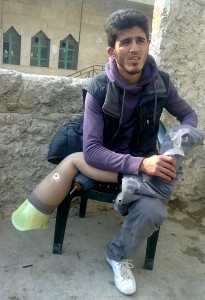Amputees Struggle in Kafr Nabel

Local council faces challenge to provide prosthetic limbs and much-needed support to those injured in conflict.
Mustafa al-Jalal
(Kafr Nabel – Syria) “What did I do to deserve this?” asks 12-year-old Raghd. “I am a young child. I hate playing now because of what happened to me. I don’t like children who run next to me because I can’t play or keep up with them.”

Raghd Jihad lost her leg when a rocket fell close to her home in Kafr Nabel in northwestern Syria. She was treated at a local hospital before being transferred to the town of Akrabat on the Turkish border where doctors had to amputate her leg and fitted her with a prosthetic limb. Raghd now lives in a displacement camp but she struggles to walk to school on the rocky, uneven ground.
As the Syrian civil war enters its fourth year the local council in Kafr Nabel is struggling to provide the necessary assistance to those who have lost limbs in the conflict. Many amputees are either struggling to cope with substandard prosthetics or go without completely.
Kfar Nabel, with a population of about 30,000, has been outside government control since August 2012.
Ten people in the town- most of them male – are currently in need of good quality prosthetics, according to statistics at the city’s local council.
Despite suffering amputations, some people speak highly of the treatment they have received for their terrible injuries.
Nasser al-Qaddour, 26, was injured by shelling during an air raid and had to have his leg amputated. He lives on the edge of Kafr Nabel and has two children.
“I used to worry that one of my children would fall sick and I would be unable to carry them to the doctor because I walk on crutches,” he said. “After getting a high quality prosthetic I am not scared of anything. My life changed completely, and I consider myself lucky to have acquired a good artificial limb.”
But others in the town have not been so lucky.
Fourteen-year-old Yahia Zakaria al-Soueid was injured by a shell from a fighter jet as he was playing in front of his house. His leg had to be amputated at the thigh. Since the operation Yahia has had problems with his prosthetic limb.
“I did not really benefit from it [the prosthetic],” he said. “It is so heavy that it prevents me from moving, and only helps me stand up. Despite many attempts, we have not been able to secure a good quality prosthetic because it is so expensive and no one donates them.”
Since the injury, Yahia’s childhood has changed significantly.
“I have been deprived from playing completely, and my movements are limited,” he said. “It bothers me greatly to see my friends running and jumping while I sit and watch them because I cannot play like they can.”
According to records from three operational hospitals in Kafr Nabel, doctors have performed 182 amputations due to conflict-related injuries since the war broke out.
Patients largely come from the surrounding towns and villages of the southern Idlib and northern Hama countryside which has suffered heavy shelling during the war.
But prosthetics are expensive, meaning amputees often have to go without or receive poor quality aids. Due to the lack of available support the majority of amputees have been transferred to Turkey for treatment.
Saeed al-Hasan, 35, a specialist in the production and fitting of prosthetics said the high costs meant that the ones amputees often receive are substandard.
“The cost of prosthetics differs according to their type and characteristics,” al-Hasan said. “They could cost anywhere between 2,000 and 80,000 US dollars. Amputees are therefore forced to get cheap ones that don’t perform as required.”
The head of Kafr Nabel’s local council, Adnan al-Qassem, says the council’s lack of assistance to amputees is down to money.
Al-Qassem said that the council keeps track of the amputees and offers them food aid baskets. The council also used to deliver monthly payments that were donated by former residents of the city who have moved abroad since the conflict started.
These payments – ranging between 7,000 and 12,000 Syrian pounds (between 40 and 70 US dollars) – lasted about six months before the donors stopped paying. Since then the council has been unable to make up the difference.
“The majority of amputees have been transferred to Turkish hospitals because of the severity of their injuries and lack of adequate equipment and facilities to treat them,” al-Qassem said.
Dr. Hasan Joulaq, an orthopedic surgeon, fits prosthetics in Kafr Nabel
But he says most of those he fits are cheaply made and can cause severe skin ulcers that cause patients a lot of discomfort. The weight of the prosthetics also impedes patients’ movement.
Prosthetics need constant monitoring during the first year after fitting because the muscles in the limb take time to gain their final shape.
Despite the difficulties with prosthetics, such has been the brutality of the war, Joulaq said that amputating limbs in so many cases had been unavoidable.
“Barrel bombs destroy houses and crush the bones of those injured,” he said. “Most cases lead to amputation, despite the fact that this is one of the last resorts for treatment.”
